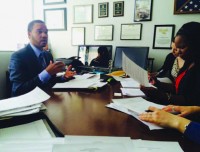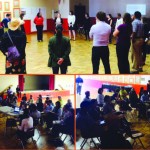
Source D’Artagnan Scorza, PhD, Founder and Executive Director
Affiliation Social Justice Learning Institute
Phone 323-952-7363
Email dscorza@sjli-cp.org
Online http://www.sjli.org
By Jennifer Miller Download PDF: SJLI.pdf
Inglewood in Southern California sits at the intersection of two freeways and right under the flight path of the Los Angeles International Airport, one of the busiest airports in the world. This community, which is over 80% people of color, is burdened by both the causes and consequences of climate change, including significant air pollution. In 2012, the Social Justice Learning Institute (SJLI) launched the Healthy and Sustainable Inglewood Collaborative (HSIC) to help the community get involved in community planning processes that could make a difference, such as the long-overdue update to the city’s General Plan. As SJLI executive director Dr. D’Artagnan Scorza puts it, “In Inglewood, climate change is a significant social justice issue.”
A Public Health Institute Creating a Climate for Health pilot project grant provided the opportunity the collaborative needed to bring several existing strands of work together to focus on climate change. Facilitated by SJLI, the Inglewood collaborative developed a Health and Climate Action Plan, to ensure that climate and health are key principles woven into the new General Plan.
“There’s quite a bit of development happening in Inglewood right now,” said Dr. Scorza, noting that the St. Louis Rams football team owner has purchased land in Inglewood and there are plans for a new NFL stadium. “We’re working to make sure that climate change adaptation is incorporated and central in community development, and that the health needs of the community are considered.”
 SJLI led the process in ways that blended trust-building and inclusiveness with focused, decision-oriented meetings that enabled the community to draft a comprehensive climate and health plan in 14 months. HSIC monthly meetings became community needs assessment workshops and a forum for developing a vision and strategy, while SJLI oversaw a review of community plans from around the country to learn from what had been done before. Public informational meetings followed, garnering additional input from across the community. The Health and Climate Action Plan was completed in October 2014 and educational/promotional campaigns roll out in summer of 2015.
SJLI led the process in ways that blended trust-building and inclusiveness with focused, decision-oriented meetings that enabled the community to draft a comprehensive climate and health plan in 14 months. HSIC monthly meetings became community needs assessment workshops and a forum for developing a vision and strategy, while SJLI oversaw a review of community plans from around the country to learn from what had been done before. Public informational meetings followed, garnering additional input from across the community. The Health and Climate Action Plan was completed in October 2014 and educational/promotional campaigns roll out in summer of 2015.
The Plan centers on a set of strategies to improve health equity outcomes while mitigating climate change across nine “settings”: transportation; urban greening; energy, waste and water; air quality; land use and zoning; food and agriculture; economic development; community engagement; and climate adaptation. HSIC members, including community residents, community-based organizations, agencies, and other partners, reviewed local data and maps and drew upon case studies from similar efforts. For each setting, SJLI talked about the local situation, provided data, and described the larger context. For example, SJLI discussed the local water supply, how it relates to the watershed, and why that watershed is depleted, before leading a group discussion about solutions.
“We defined climate change in a relatable way, helping our residents understand, for example, how climate change may be linked to your grandmother getting a heat stroke,” explains Scorza. “The process let folks define what adaptation means to them, whether that’s planting trees or reducing car travel or growing food.” Collaborative members selected their highest priority strategies for each setting.
Key partnerships strengthened the process. TreePeople co-led the planning process. The Los Angeles County Department of Public Health (LACDPH) helped ensure that health was woven into all of the strategies, and alerted the group to grant opportunities. LACDPH also conducted a more in-depth community assessment, with SJLI youth, through the Communities of Excellence in Nutrition, Physical Activity and Obesity Prevention (CX3) program. The collaborative involved the city planning department as a participating member of the collaborative early on, so that the plan that emerged would be welcomed by the department.
The Health and Climate Action Plan is under review, but has already served as the basis for an active transportation grant that will begin to make the community’s vision for Inglewood a reality. Start to finish, SJLI worked to create a plan that would have traction, from building partnerships, to providing well-researched background information, to ongoing community outreach. “A collaborative planning process takes a little bit longer,” Dr. Scorza concludes, “but lets you make sure the strategies in the plan are ones you can run with immediately, because the community has ownership over them.”
For more information:
Social Justice Learning Institute: www.sjli.org
D’Artagnan Scorza, PhD, Founder and Executive Director, 323-952-7363, dscorza@sjli-cp.org
Jennifer Miller is a Senior Researcher with the Public Health Institute.


